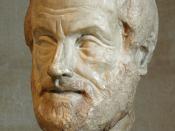A
Virtue Theory is the theory that right actions follow from becoming a moral person, and that by becoming a moral person we will automatically know what is right and wrong. When we know what is truly right or wrong we have flourished as humans, and we have eudemonia. Virtue ethics is one of the main forms of normative ethics, and often called arêtaic ethics (arête- virtue, from Greek). It contrasts deontology, which emphasizes rules and duties. A virtue is an admirable human characteristic such as courage, kindness or forgiveness that distinguishes good people from bad. Socrates sought a single virtue for human life, while Plato identified four central virtues that should be present in the ideal state. Aristotle said that a moral virtue is the middle value between two extremes. Christianity preaches virtues such as forgiveness and love to make a moral person.
For Socrates, the ultimate virtue is knowledge.
With knowledge he argued, morality comes. If people had knowledge of what was good and bad, people would not sin. He said that all wrongdoing is involuntary, and that if people had knowledge of right and wrong, they would know not to sin.
Plato said the soul had three parts. He said these were reason, emotion and desire. In order to become a moral person, Plato said we had to learn the three virtues to control these parts of the soul. These were wisdom, courage and self-control. With a virtue for each part of the soul, and an equal balance of each part of the soul, Plato said we would become moral people. Wisdom would aid reason to think well, courage would override emotion, and self-control would manage desire. We see ho0w balancing the parts of the soul and having virtues would help us lead good lives in the...


